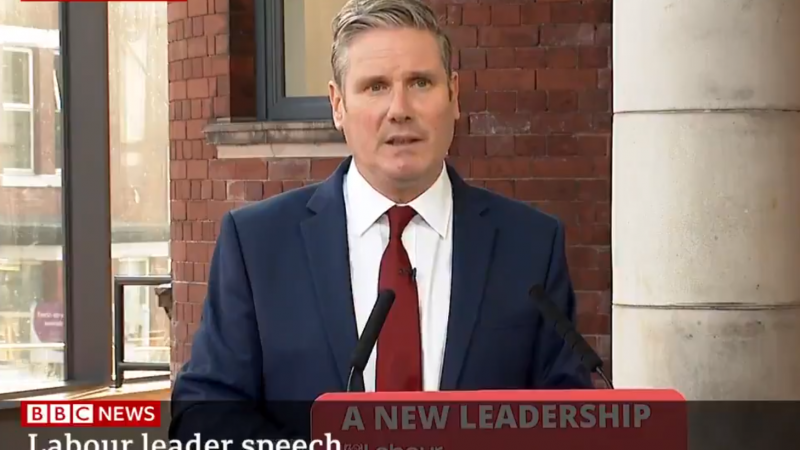'I could not vote for a Labour party which started mirroring the Tories’ stance on immigration and race,' says Maheen Behrana

Although a recent poll suggests that Conservatives would lose their majority if a general election were to take place today, the horizon is not necessarily rosy for the Labour party either.
While the government flails and flounders on Covid-19, a certain topic crops up every so often which suggests that Labour may face significant stumbling blocks, especially as it reaches out to voters ahead of the next election. That challenge is, of course, its narrative around race and immigration.
A couple of recent Guardian reports from Bassetlaw and Leigh suggest that some voters who switched to the Tories in these former Labour heartlands or ‘red wall’ constituencies continue to hold anti-immigration and sometimes racially prejudiced views.
While they may be losing trust in Boris Johnson, many feel that Starmer still needs to prove his credentials and are dubious about his stance on issues such as foreign aid and the deportation of foreign nationals convicted of crimes – something many labour MPs have condemned (though Starmer himself has notably been quieter).
Polling data shows us that older voters were more likely to vote for the Conservatives at the last general election, and also shows us that Black and ethnic minority voters were significantly more likely to vote Labour.
Constituencies with higher numbers of younger people also tended to have a higher proportions of ethnic minority voters. Those like Bassetlaw and Leigh, on the other hand, have larger proportions of over 65s than many Labour-voting areas, and are typically less ethnically diverse than most Labour seats.
There is without doubt a divide between ‘traditional’ Labour voters – the ones Starmer seeks to win back – and Labour’s increasingly young and diverse voter base.
As a young, minority ethnic Labour voter, I have been disappointed with many of Starmer’s responses to issues concerning race and immigration.
His silence and forced neutrality at pivotal moments has resulted in what I see as significant failures. I was deeply troubled when Starmer did not condemn the home secretary for her plan to use the Navy to prevent refugees from reaching British shores. I was disturbed when he failed to challenge an LBC caller who presented the racist ‘great replacement’ theory as if it were fact.
Let me be categorical about one thing: I could not vote for a Labour party which started mirroring the Tories’ stance on immigration and race; which denied the existence of systemic racism or which conflated refugees with criminals.
Labour should not pander to these views, but nor should it dismiss those who have been taken in by the sensationalist rhetoric surrounding them. The divide between ‘traditional’ Labour voters and younger ones may exist, but it has been capitalised on by the Conservatives and their media cheerleaders.
At every turn they dismiss Labour as ‘woke’ and seek to present support for Black Lives Matter and a belief in the existence of systemic racism as anti-patriotic.
Why is this? Well, of course the Conservatives want to undermine support for Labour, but their rhetoric also falls into the classic narrative of ‘divide and conquer’. When people like Ben Bradley present immigration as a genuine problem for the lives of working-class voters, but simultaneously fail to champion free school meals for children in low-income families, we know that their ‘concern’ does not come from a place of genuine solidarity with the working classes.
Instead, they seek to make immigrants (and often ‘woke’ ethnic minorities) scapegoats for the hardships faced by poor, white working class voters.
In turn, this deflects from not only the failings of the Conservatives, but also pits poor and middle-income people against each other, leaving the Tories free to pursue their agendas of cronyism and (in non-Covid times) tax breaks for their wealthy supporters with less scrutiny than they ought to receive.
So this is my challenge to Keir Starmer and the wider Labour party. We must change Labour’s narrative on race and immigration.
We should not insist that all immigration sceptics are racist, but nor should we pander to attitudes that frame immigrants as detrimental to British life. We need to show that most voters – be they poor, middle-income, Black, white, old or young – have more in common with each other than they do with those that the Tories truly support.
Our bread is not buttered by a party that will impoverish the NHS, give money without due process to its friends and jab holes in a welfare state that ought to protect us all. It is time for the Labour party to show that most of us have a common enemy in the wealthy elite, who run much of our media and donate heavily to the Tories.
Unless Labour reframes this narrative, it can neither hope to win back voters nor do its job as the party of the people.
Maheen Behrana is a writer and Editor-in-Chief at at BBench.co.uk
Left Foot Forward doesn't have the backing of big business or billionaires. We rely on the kind and generous support of ordinary people like you.
You can support hard-hitting journalism that holds the right to account, provides a forum for debate among progressives, and covers the stories the rest of the media ignore. Donate today.



